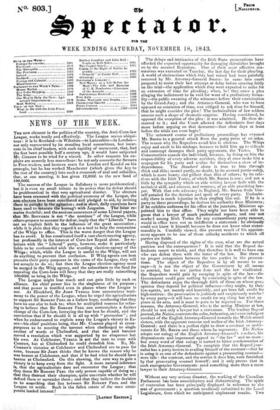The delays and intricacies of the Irish State prosecutions have
afforded the expected opportunity for damaging skirmishes brought on by the accused Repealers. One of their most effective ma- nceuvres was executed on Tuesday, the last day for their pleading. A world of obstructions which they had raised had been painfully removed by Mr. Attorney-General Sauna : he came into court prepared to resist their last attempt at delay before entering fairly on the trial—the application which they were expected to make for an extension of time for pleading ; when, lo ! they enter a plea alleging the indictment to be void for want of a preliminary forma- lity—the public swearing of the witnesses before their examination by the Grand Jury ; and the Attorney-General, who was to have opposed an extension of time was obliged to ask time for himself; that he might consider the plea! The technicalities of law seldom assume such a shape of dramatic surprise. Having considered, he opposed the reception of the plea : it was admitted. He then de- murred to it ; and the Court allowed the defendants four days more before arguing on that demurrer—four clear days at least before the trials can even begin!
The untoward course of preliminary proceedings has exposed Mr. SMITH to a general attack from the party press of nil sides. The reason why the Repealers assail him is obvious. The Whigs enjoy and exult in his mishaps, because to hold him up to ridicule and contempt damages their party opponents, the Tories. The Conservatives assault the individual, because, by fixing on him the responsibility of every adverse accident, they at once make him a scapegoat for his party and realize for themselves a show of in- dependence. The Standard alone is true to him through thick and thin; moved partly, no doubt, by its avowed partisanship, which is more hearty and gallant than that of others ; by its rela- tions with the Irish Tories, of which Mr. Smitit is one ; and not a little by the sympathy which an able writing lawyer feels with the technical skill, and success, and reverses, of an able practising law- yer. With that sole advocacy in England, Mr. SMITH finds him- self paraded for the derision and sport of every party. Undoubt- edly there is much injustice in thus singling him out If te is a party to these proceedings, he derives his authority from Ministers; if he exhibits unfitness for his office at the juncture, Ministers ap- pointed him to that office. They might not have been able to guess that a lawyer qf much professional repute, and one not marked among Irish Tories for any extraordinary party rancour, would in office turn out so indifferent a statesman : he obviously could not know it himself; because he does not know what states- manship is. Candidly viewed, this present result of his appoint- ment appears to he one of those unlucky accidents to which all parties are liable. Having disposed of the rights of the case, what are the actual position and the consequences ? It is said that the Repeal de- fendants resort to tricks, and that therefore it is well to have one who can defeat them with the letter of the law. But there is no proper antagonism between the two parties in the prosecu- tions. The object of the Repealers is by all means to es- cape—it is not the object of the Government by all means to convict, but to see justice done and the law vindicated . the Repealers would gain by escaping in spite of the law—the Government could gain nothing by convicting in spite of the law. The defendants enjoy the thorough faith of those on whose goo: opinion they depend for political influence—they might, by their law-agents, act meanly and knavishly, and yet have full credit for high motives : the prosecution is jealously and suspiciously watche,S by every party—it will have no credit for any thing but what ap pears in its acts, and it must be pure to be reputed so. For these reasons, the Attorney-General, who is the acting Minister at law, should be not only a lawyer but a statesman. The leading Repeal journal, the Nation, contrasts the calm, forbearing, and even indulgent
conduct of the English Attorney-General towards the Welsh armed rioters, with the apparent rancour and malice of the Irish Attorney- General: and there is a perfect right to draw a contrast so unfor-
tunate for Mr. SMITH and those whom he represents. The Nation
adopts our eulogy of the English Attorney-General's conduct, his dispassionate and impersonal appeal to "the law" and no more : but every word of that eulogy is turned to bitter condemnation of the Irish Attorney-General. To complain that the Repeal jour- nalist has a party motive in availing himself of the contrast—that he is using it as one of the defendants against a prosecuting counsel— were idle : the contrast, and the service it does him, were furnished by that prosecuting counsel himself; and it only proves that in such emergencies Governments need something more than a mere lawyer in their Attorney-General.
























